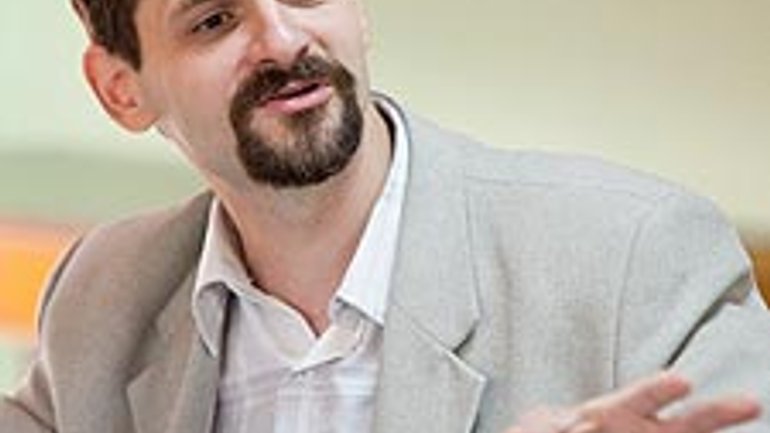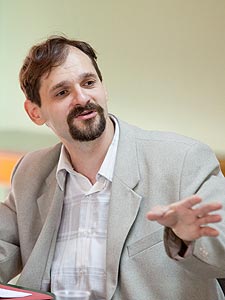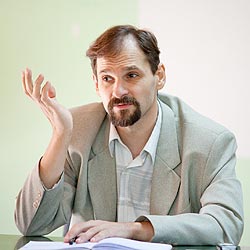The need of Ukrainian Radical Orthodoxy

 One may answer these two challenges and thus perform this spiritual revival if based on a native Ukrainian version of Radical Orthodoxy.
One may answer these two challenges and thus perform this spiritual revival if based on a native Ukrainian version of Radical Orthodoxy.
Radical Orthodoxy is a theological movement, initiated by the Protestants, but which at present has expanded its influence over modern catholic and protestant theologians. This sole fact is indicative of its large potential and highly urgent character. Among the Protestant and Catholic adherents of Radical Orthodoxy there are the following prominent theologians: John Milbank, Catherine Pickstock, Graham Ward, Laurence Paul Hemming, William T. Cavanaugh, Conor Cunningham, Frederick Ch. Bauerschmidt, Michael Hanby, Gerald Loughlin, John Montag, Daniel Bell, James K. A. Smith, Tracey Rowland, D. Stephen Long. The most prominent among the orthodox radical theologians are David Bentley Hart, archimandrite John Panteleimon Manoussakis, archpriest John Behr (dean of St Vladimir Theological Seminary), Pantelis Kalaitzidis (Director of the Volos Academy for Theological Studies), Fr Theodore Stilianopulos, Alexander Filonenko. The formation of Radical Orthodoxy was influenced by the works of K. Barth, Hans Urs von Balthasar, M.Blondel, R.Williams.
The founders of theological movement explain the name of the Radical Orthodoxy in the following way: "Orthodox in the most straightforward sense of commitment to credal Christianity and the exemplarity of its patristic matrix. But orthodox also in the more specific sense of re-affirming a richer and more coherent Christianity which was gradually lost sight of after the late Middle Ages. In this way the designation ‘orthodox’ here transcends confessional boundaries, since both Protestant biblicism and post-tridentine Catholic positivist authoritarianism are seen as aberrant results of theological distortions already dominant even before the early modern period. … Radical, first of all, in the sense of a return to patristic and medieval roots, and especially to the Augustinian vision of all knowledge as divine illumination—a notion which transcends the modern bastard dualisms of faith and reason, grace and nature. Radical, second, in the sense of seeking to deploy this recovered vision systematically to criticise modern society, culture, politics, art, science and philosophy with an unprecedented boldness. But radical in yet a third sense of realising that via such engagements we do have also to rethink the tradition"[1].
 Radical Orthodoxy is a return to sources performed in the postmodern era, when this return is considered almost impossible. Nevertheless, this return occurs, thus proving its practical feasibility. Every confessional variant of Radical Orthodoxy has its own understanding what are these sources. The Orthodox return to the theology of St Gregory of Nyssa and of St Maximus the Confessor, revealing their post-metaphysical potential. The Catholics draw on the theology of the Holy Fathers of the first millennium (in particular to the thought of St Augustine) and on the early scholastics re-interpreted in the spirit of patristic theology. Both the Orthodox and the Catholics make a radical return to the Scripture and Eucharistic laudation as the two bases of all Christian life. The Protestants return to Luther and the Fathers of Reformation in general. Therefore Radical Orthodoxy in Protestantism resonates with a classic demand of permanent reformation, constant renewal of the basic reformatory impulse. Obviously, the protestant Radical Orthodoxy is first of all the return to the One Source, One Basis – to Christ. Present-day Radical Orthodoxy in the Orthodoxy and Catholicism also has some important tendencies: a doctrine of priority of the truths of the Scripture, demand of radical Christ-centeredness both of theology and life of the Christians.
Radical Orthodoxy is a return to sources performed in the postmodern era, when this return is considered almost impossible. Nevertheless, this return occurs, thus proving its practical feasibility. Every confessional variant of Radical Orthodoxy has its own understanding what are these sources. The Orthodox return to the theology of St Gregory of Nyssa and of St Maximus the Confessor, revealing their post-metaphysical potential. The Catholics draw on the theology of the Holy Fathers of the first millennium (in particular to the thought of St Augustine) and on the early scholastics re-interpreted in the spirit of patristic theology. Both the Orthodox and the Catholics make a radical return to the Scripture and Eucharistic laudation as the two bases of all Christian life. The Protestants return to Luther and the Fathers of Reformation in general. Therefore Radical Orthodoxy in Protestantism resonates with a classic demand of permanent reformation, constant renewal of the basic reformatory impulse. Obviously, the protestant Radical Orthodoxy is first of all the return to the One Source, One Basis – to Christ. Present-day Radical Orthodoxy in the Orthodoxy and Catholicism also has some important tendencies: a doctrine of priority of the truths of the Scripture, demand of radical Christ-centeredness both of theology and life of the Christians.
Radical Orthodoxy opposes the world, but in a different way than Neo-orthodoxy of Karl Barth does. While Barth believed that we needed to return radically to the one basis, de facto having dissociated ourselves from the world, culture, philosophy, the theologians of Radical Orthodoxy conceive the issue differently. The entire construction of a positive Christian culture should be built on the sole basis of the Gospel Truth and the demands of the Revelation. Own theology should be created as a meta-narrative for all sciences, especially for the humanities. Radical demands of biblical morality should be put forward as imperatives for politicians and public leaders. There should be no fear of entering all social institutes and to show Christian alternative to the present-day relativism and destitution of principle.
While the liberal theology wanted to embed Christianity into the ready house of the existing civilization and culture, Radical Orthodoxy suggests avoiding such a mistake. It suggests not to be incorporated into the world, getting adjusted to it, but to invite the whole world to rest on the sole reliable foundation. More exactly, we should ourselves start building our culture and civilization on this universal Basis, penetrating throughout the entire space of the human mode of being. We should involve to the extent possible all the citizens of the postmodern world into construction of a Christian city.
The Ukrainian Christians are now already in need of three main components of Radical Orthodoxy: 1) a renewed theology, relevant in postmodern times; 2) a developed social doctrine, putting forward radical demands and high Christian requirements to Churches and society 3) an ideology of constructive overall impact on the society.
In order to correctly build up theology as a theory and a rhetorical practice in present-day Ukrainian conditions, we should elaborate our own version of Radical Orthodoxy. In the Radical Orthodoxy of John Milbank, C. Pickstock, G.Ward and J.Smith there are many rudimentary remnants of metaphysical thinking as yet. Their attitude towards the ideas of the early scholastics still remains uncritical. In Ukrainian realities these metaphysical elements of Radical Orthodoxy should be reconsidered and even in many respects rejected. One should not be afraid of going through the experience of Radical Orthodoxy of J. Manoussakis and D.Hart, who, while having accepted Radical Orthodoxy on the whole, re-interpreted it in a much more radical way. First, they determinately passed from almost all metaphysical schemes to the Revelation of God in the Scripture. Second, they conceived in a more radical way the experience of laudation of God, the experience of thanksgiving - as a Christian mode of individual and social being.
Besides, it is hardly possible to accept the ideas of some radical orthodox thinkers about Christian socialism. For all the general correctness of the critical analysis of capitalism, J.Milbank’s ideas of Christian socialism are utopia and populism. Utopian and populist consciousness already cankers the outlook of the Ukrainian society like cancerous growth anyway. Utopia and populism added to Christian outlook, and these territories might be stigmatized as hopeless beyond recall. Ukrainian Christians are to elaborate their own social project, their own theory of social communication, their view of the future social institutions, the state and the civil society. It may be definitely said that the Christians of Ukraine need their Christian solidarity as social doctrine and Christian ethics of responsibility as ontology of existence of moral personality and moral society.
The main advantage of Radical Orthodoxy is its pursuit of building a Christian culture, of penetrating into all realms of social life without accepting the standards of the world, providing instead its own qualitatively better standards. The top-priority task is winning the elite of the civil society, winning the brains of the nations. To a large extent the destiny of the state and society depends today on the elite. For the adequate dialogue with the leaders of public opinion, Christians have to advance their own educated speakers. In order to gain sympathy of an intellectual elite a quality Christian product is required, as well as theological and religious-philosophical books of the world level quality and impact, glossy magazines with the subject matter of relevance for the society and the politicum, in perspective – our own valid TV – not a Christian TV for Christians, but a Christian TV for everyone. The Christians should enter the university as philosophers, cultural studies experts, historians, philologists. What is most important – it is necessary that in Ukraine not merely the Orthodox theology returned to the university. The modern protestant theology should also be included. The Catholics and Greek Catholics have to think over once again whether they are serious in their desire to have their theology at the university. It is obvious that the Protestants and the Orthodox have already got the people to get into the modern university, while the Catholics and the Greek Catholics are in search for their message yet. Note that the difference in the attitude towards theology is quite perceptible: while the Greek Catholic patriarch and the rector of the Ukrainian Catholic University are in the state of inquiry, caused by the crisis of their theology, an orthodox metropolitan has flatly outlined a program of development of the Ukrainian theology for the decades to come. Christian theologians of Ukraine should think over what exactly they would like to say in the academic discourse, which is the University, and to work out with accuracy the appropriate forms of presenting their ideas, concepts and social messages. And it is possible that Ukraine is the very country, at whose universities theology will occupy better positions than it does at the universities of the West. The main thing is not to be afraid to take responsibility for the whole society. If not Christians – who will be able to build Ukraine as a successful state and a prosperous society? Secular political experts speak a lot about their hopes for the middle class, forgetting at the same time that in all the successful states the middle class was religiously motivated, had its religious ethics, its understanding of responsibility for itself and the entire society.
Thus, the Christians of Ukraine should try to unite their efforts at the level of horizontal connections. A Christian civil society, having its ideas and principles, openly and daringly preaching them, included into all social institutes and reforming both itself and the entire society: this is to be done not because it is possible to do, but because this is our Christian responsibility to God and our children. We can try, so we have to try. What the Christians have got today – the people, ideas and resources are the gold reserve of Ukraine, the point of application, owing to which one may transform Ukraine into a truly Christian country with a Christian society, with new social and cultural atmosphere. One should dare and run a risk of starting a new page of history. Once the ancient Jews stood on the threshold of the Promised Land and were afraid of making the last crucial effort – to enter and take possession of their inheritance. The Christians of Ukraine are also standing on the threshold of their own country. But it is time to take a decision and to start acting in an absolutely new way, in the spirit of Radical Orthodoxy.
Using analogy with military actions, it is the current pressure on Christians by the post-soviet legacy, postmodernism and other religions – all that makes the attack necessary. In the memoires of general Denikin “Way of the Russian Officer” there is an interesting moment in description of the fighting on the front of the World War I: “The enemy largely outnumbered us, almost three times, and it was impossible to resist under such circumstances. I decided to attack.” At a first glance it was illogical to attack the enemy three times superior. But the practice of the military action proves: when taking a defensive stance one gets gradually beaten up by the three times superior enemy. Taking the initiative and attacking his territory with concentrated blows helps at least to preserve one’s own army or even to win at the best case. Though our war is the spiritual one, and our aim is not defeat but conversion, on the whole the analogy may be like that: we have to attack because there is simply no other way. In the defensive stance one gets beaten sooner or later. And the attack has to be radical, taking advantage of every opportunity available now.
The Christians of Ukraine must not merely realize their own responsibility for the country and the society, must not just make for building up a full-valued Christian culture and their presence in all the domains of public life. Responsibility for the country is also an ability to propose radical changes here and now in some or other social issues of crucial importance, in other words, behaving as citizens of the future Kingdom of Heaven when solving particular problems of society here and now. At the same time it should be neither campaigns nor technologies, but rather a Christian urge, a Christian radical action, a sort of common Christian movement.
[1] Milbank J., Pickstock С., Ward G. Introduction. Suspending the material: the turn of radical orthodoxy // Radical orthodoxy. A new theology. Ed. by John Milbank, Catherine Pickstock and Graham Ward. London: Routledge, 1999. P. 2.









